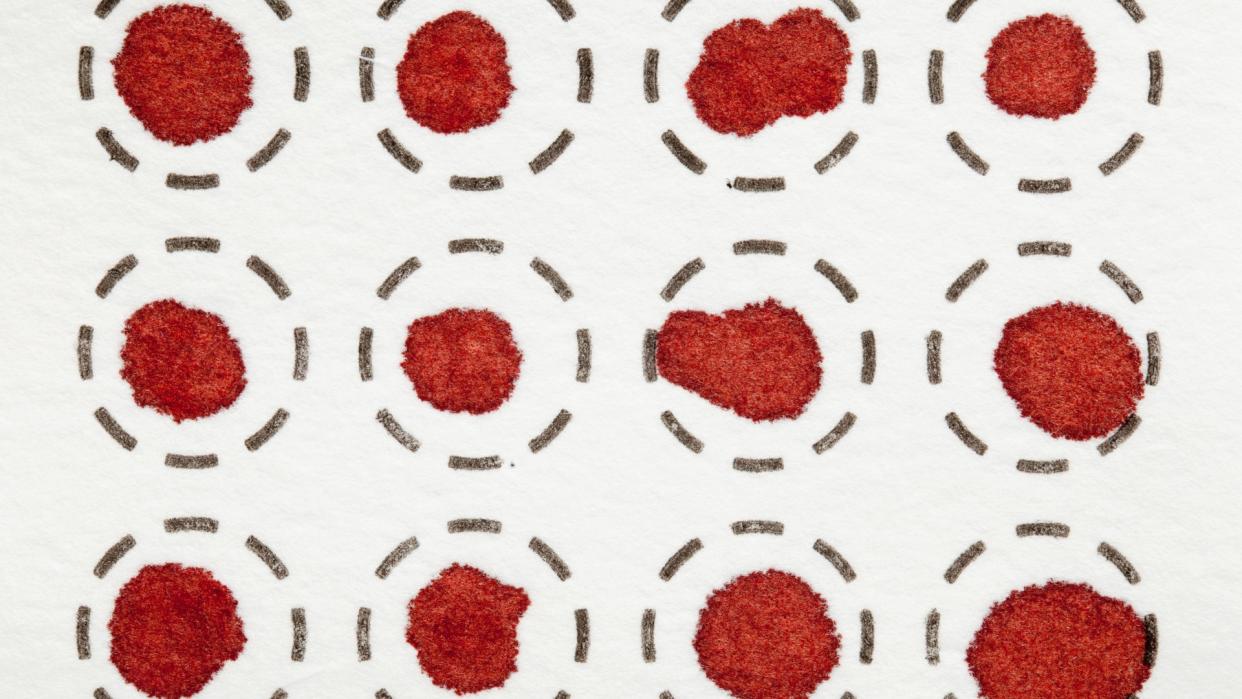Detecting cancer in minutes possible with just a drop of dried blood and new test, study hints

A new AI-powered test could one day be used to accurately and quickly detect three major types of cancer using only a single spot of dried blood.
In preliminary experiments, the tool was able to distinguish between patients with diagnosed pancreatic, gastric or colorectal cancer and people without cancer — and the analysis took just minutes. By detecting certain chemicals in blood, the test could identify when a patient had cancer around 82% to 100% of the time, researchers say.
The new tool uses machine learning, a type of artificial intelligence (AI), to analyze by-products of metabolism, or metabolites, in blood samples. These metabolites — which are found in the liquid portion of blood known as serum — act as "biomarkers" that can potentially flag cancer's presence in the body.
Screening for these blood biomarkers has been proposed as a potential way to diagnose cancer at earlier stages of the disease, when survival rates are higher and patients may have no telltale symptoms. Despite being some of the world's deadliest cancers, pancreatic, colorectal and gastric cancers currently have no standalone blood tests that are accurate enough to diagnose the diseases on their own. Instead, doctors usually rely on imaging or surgical procedures to detect cancerous tissue.
Related: Cancer patients can now be 'matched' to best treatment with DNA and lab-dish experiments
The new test would theoretically require less than 0.05 milliliters of blood to diagnose these diseases. That's according to the scientists in China who developed the test and described their findings in a paper published Monday (April 22) in the journal Nature Sustainability.
Compared to liquid blood, dried serum can be "collected, stored and transported at much lower cost and with much simpler equipment," said Dr. Chaoyuan Kuang, an assistant professor at the Albert Einstein College of Medicine and an oncologist at Montefiore Health System who was not involved in the research.
Because of the ease of storing dried blood, "this could help democratize the availability of cancer early detection testing across the world," Kuang told Live Science in an email.
However, the new cancer-detecting test likely won't enter use for a long time, he added. "We are most likely still years away from being able to offer this test to patients in a widespread fashion," Kuang said.
In the new study, the researchers ran several proof-of-concept tests that demonstrated the tool could accurately differentiate between blood donors with cancer versus those without it. They also showed that dried blood worked as well as traditional liquid blood-based tests. For example, in one experiment, using the dried blood spots enabled them to detect 81.2% of cases of pancreatic cancer, compared to 76.8% using liquid blood samples.
In the U.S., only one biomarker is currently approved by the Food and Drug Administration to diagnose pancreatic cancer. It's known as CA19-9, and current tests that detect the metabolite are around 80% accurate at identifying symptomatic cases of the disease. However, they flag only 13% of cases in which patients have no symptoms, so they're not as useful for super-early cancer detection.
The scientists behind the new test say that, if used in large cancer screening programs, their test could make a huge difference. Based on modeling they performed, they reported the new tool could reduce the estimated proportion of undiagnosed cases of pancreatic, gastric and colorectal cancers by about 20% to 50% if it was used for population-level cancer screening in rural China.
The new paper is a "great start," Kuang said. However, validating the new tool will require more testing, especially in large, diverse populations, he said. The study only tested a few hundred samples of blood, so it's unclear how well the findings will apply to other groups. The researchers also only tested the machine learning model on people who were already known to have cancer; they've yet to test its utility as a true diagnostic tool.
A blood test like this would need to go through "extensive clinical trials" with thousands of patients and regulatory review, Dr. Michael Cecchini, co-director of the colorectal program at the Center for Gastrointestinal Cancers at the Yale Cancer Center who was not involved in the research, told Live Science in an email.
RELATED STORIES
—Gut bacteria linked to colorectal cancer in young people
—New mRNA 'cancer vaccine' trial launches in UK
Nevertheless, the tool's potential is "immense," Kuang said. With further development, it could theoretically be used for the early detection of other types of cancer or for other diseases, or to monitor the progression of disease in patients who have already been diagnosed, he said.
By 2030, scientists estimate that around 75% of cancer deaths will occur in low- and middle-income countries, where people face disproportionately-high barriers to medical care. The new tool, in part because it uses dried blood, could help improve access to tests in remote areas where resources are limited, the study authors wrote in their report.
Ever wonder why some people build muscle more easily than others or why freckles come out in the sun? Send us your questions about how the human body works to community@livescience.com with the subject line "Health Desk Q," and you may see your question answered on the website!

